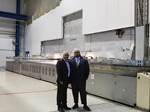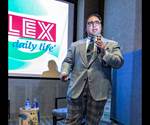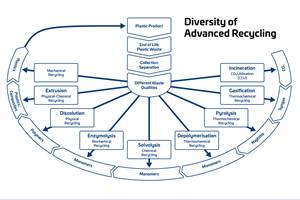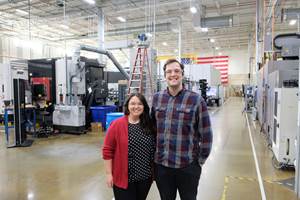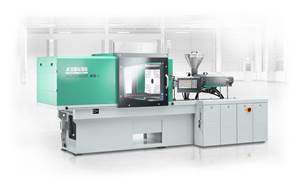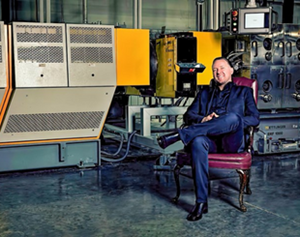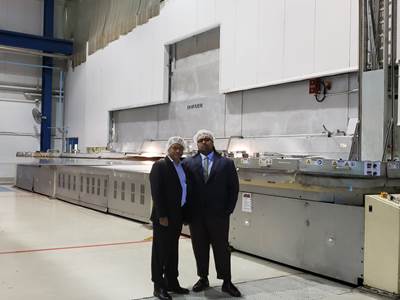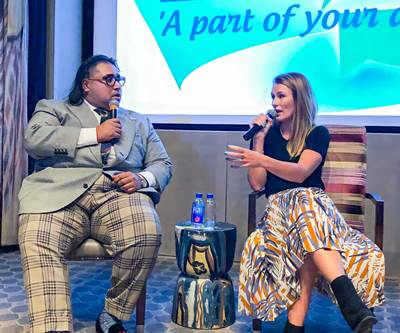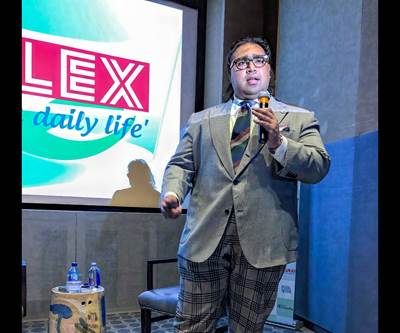This Flexible-Film Giant Has Sustainability in its DNA
UFlex, a global manufacturer of flexible packaging film with plants all over the world, discusses what ‘sustainability’ means to its operations.
Share
Read Next
UFlex is India’s largest multinational flexible packaging films and makes a wide variety of flexible packaging films at plants around the world, including one in Elizabethtown, Ky. It has a global capacity in excess of 5 million tons/yr.
Not surprisingly, this film giant focuses heavily on sustainability. UFlex’s global sustainability initiative Project Plastic Fix, is designed to form solutions that focuses on solutions to keep plastic in the economy and out of the environment.
Recently, Plastics Technology discussed UFlex’s holistic approach to sustainability with Jeevaraj Pillai, the company's joint president of packaging & new product development.
Plastics Technology: How does UFlex define sustainability?
Jeevaraj Pillai: At UFlex, sustainability is a cornerstone of our business strategy. Our definition of sustainability includes adopting sustainable business practices that are feasible, in our long-term goal of creating ‘people,’ ‘planet’ and ‘profit’ plans and promoting a world of coexistence. UFlex has a strong focus on environment-friendly product designs and manufactures innovative and sustainable products and solutions for its customers across global markets. These products and solutions can be easily recycled or upcycled and leave no detrimental impact on the environment.
With sustainability at the core of our organization, we focus on source reduction — manufacturing films made of recycled content such as our green PET film Asclepius; source substitution — exemplified in our range of paper-based packaging tubes Kraftika; multi-layer plastic and PET bottle recycling; and bio-degradable materials that are currently in the trial stage.
UFlex recycling facilities at Noida, India are recycling and upcycling post-consumer multi-layer mixed plastic waste which are used to manufacture value-added household and industrial plastic products such as stroller bags, irrigation pipes, dustbins, flower pots, buckets, and more.
Sustainability is in the DNA of UFlex — it permeates our products and processes and delivers on our carbon neutrality goals.
UFlex has recycled more than half a million tons of multi-layer mixed plastic waste so far and has spent more than $20 million in the last financial year at its Poland and Mexico recycling sites.
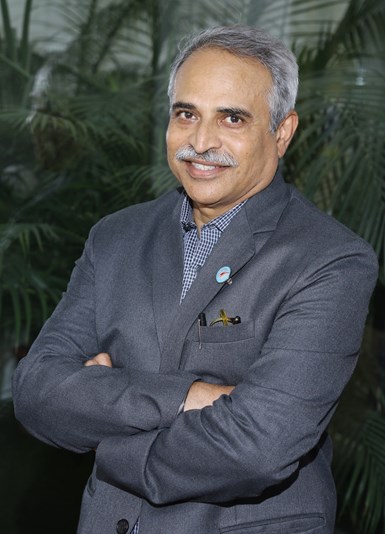
Jeevaraj Pillai, joint president, packaging & new product development, UFlex Ltd.
Photo: UFlex Ltd.
One of our strategic goals has always been to develop a robust portfolio of innovative and sustainable offerings which can be recycled or finds a second life post-consumption.
Our endeavor is to create an ecosystem that inspires brands to commit to developing sustainable products and contributing toward a circular economy.
Q: What are the driving forces behind your sustainability efforts?
A: At UFlex, our prime focus has always been to achieve operational excellence and growth while upholding our responsibility toward the planet and society. We have always adopted a progressive approach when it comes to innovation and sustainability.
In 1995, at the Davos Recycling Forum, we were recognized as the first company in the world to recycle mixed plastic waste from our recycling facilities in Noida, NCR-India and our efforts have also been acknowledged by the Government of India. Let me talk about two lines in particular:
- PET Bottle Line (PCR Line): The Post Consumer Recyclate (PCR line) is set up with the objective to recycle PET bottles discarded after use by consumers, to convert it into polyester granules. The granules are further upcycled to manufacture UFlex’s range of PCR grade BOPET packaging film called Asclepius.
- The MLP Film Line (PCPR Line): The Post-Consumer Plastic Recyclate (PCPR) line washes post-consumer mixed MLP waste and recycles them into granules. The granules derived can be used to form industrial and household products. The post-consumer MLP waste collected from urban households is sourced from non-profit organizations.
Q: Can you provide me with examples of how UFlex collaborated with a brand owner to make a package more sustainable?
A: One of the finest examples is when we collaborated with a leading rice brand to make its packaging structure more sustainable. Their conventional rice packaging comprised of different layers of polymers that delivered the desired performance attributes but with a lower recycling quotient. The rice brand approached us to develop a packaging structure that delivered the same attributes with an enhanced recycling quotient.
Another example that comes to mind is when UFlex developed a packaging structure for a leading global food processing company for its brand of instant noodles. The sustainable innovation involved replacing a packaging material with a heterogeneous composition with a PP based Mono-polymer structure to achieve a recyclability quotient of No. 5.
In addition to these, we have several other examples where we have developed more sustainable packaging structures for customers.
Q: Do your sustainability efforts extend to your manufacturing facilities? For example, how you use energy and consumer resources at your plants around the world?
A: Sustainability is in the DNA of UFlex — it permeates our products and processes and delivers on our carbon neutrality goals. To enhance our sustainable footprint across our manufacturing facilities, we have made investments in advanced technologies that consume lesser energy per ton to manufacture flexible packaging.
Our focus on sustainability also reflects in our source reduction approach to running our manufacturing facilities. UFlex’s chemicals business has set up a Zero Liquid Discharge (ZLD) engineering process at its manufacturing facility that optimizes water usage. With this process, the chemicals manufacturing plant can now save up to 20 kiloliters of water every day. Our chemicals business has been recognized by leading industry forums for its sustainability initiatives in water management. It was also conferred with a leading industry award for effective and innovative implementation of environment and safety processes.
Other measures include replacing the heating systems of our machines — from liquid fuel to gas-based heating systems.
Our focus on sustainability also reflects in our source reduction approach to running our manufacturing facilities.
In addition, most of our manufacturing plants practice the Zero solid waste discharge Policy.
Q: How do you balance the pursuit of sustainability with a requirement for product protection, especially in the area of food packaging?
A: Innovation makes the balancing act possible. We create products and solutions factoring in sustainability in the structure while delivering protection and safety attributes.
We invest in extensive research for source substitution of difficult-to-recycle materials such as aluminum foil. Aluminum foil is one of the most important layers within certain flexible multi-layer plastics (MLP) products. It is used to give strength as well as durability to the packaging along with other barrier properties. However, it is a very difficult material to recycle, due to the fact that we first need to separate the aluminum foil from other layers and then process the remaining plastic layers.
UFlex’s research teams have come up with a solution of replacing this aluminum foil by altering the remaining films; thereby, making the post-consumer waste 100% recyclable.
This is just one example of the many where we have developed products with higher recyclability or sustainability quotients without compromising on the barrier properties.
Q: What are some of the innovations UFlex has developed to meet its sustainability objectives?
A: UFlex is present across the complete value chain of flexible packaging. To cater to the growing need for sustainable packaging options for a coffee brand, we developed a unique eco-friendly pack with a standable pack structure that offers good barrier properties. Its one-side valve helps retain the freshness of coffee and prevents it from extraneous factors like moisture and air.
Our packaging films vertical has developed the B-TEM BOPP film. It is a high-barrier film that provides an excellent barrier against oxygen. The mono-material film is developed with coating on one side and corona treatment on the other side and stands high on the sustainability quotient due to its easy recyclability.
Our chemicals business has developed a wide range of green inks and adhesives and our recent innovation FLEXBOND SF WET LM 35 is designed largely for the wet lamination of clear BOPP and PVC films to paper or duplex boards. Applicable with manual or semi-automatic machines, the adhesive is water-based and that makes the product more sustainable. We are migrating more and more from solvent-based to water-based inks.
Q: Does UFlex use any bio-resins? What about post-consumer reclaim?
A: At present, we are not using any bio-resins. Bio-resins so far have not been found appropriate for the functional requirements of flexible packaging like a barrier, seal, and mechanical properties for flexible packaging applications.
Hence, Bio-resins are primarily used for single-use-plastic applications only.
Related Content
Advanced Recycling: Beyond Pyrolysis
Consumer-product brand owners increasingly see advanced chemical recycling as a necessary complement to mechanical recycling if they are to meet ambitious goals for a circular economy in the next decade. Dozens of technology providers are developing new technologies to overcome the limitations of existing pyrolysis methods and to commercialize various alternative approaches to chemical recycling of plastics.
Read MoreScaling Up Sustainable Solutions for Fiber Reinforced Composite Materials
Oak Ridge National Laboratory's Sustainable Manufacturing Technologies Group helps industrial partners tackle the sustainability challenges presented by fiber-reinforced composite materials.
Read MoreCalculating an Injection Molding Machine’s Carbon Footprint
Arburg has utilized the ISO TS 1467:2018 standard, which determines the greenhouse gas emissions of a product, to help its customers calculate the product carbon footprint (PCF) of its injection molding machines.
Read MoreA Recycling Plant, Renewed
Reinvention is essential at Capital Polymers, a toll recycler that has completely transformed its operation in a short period of time.
Read MoreRead Next
Innovation, Customization & Sustainability: How Flex Films Focuses on U.S. Market
Global player in BOPET film has big plans for U.S. market with innovative products developed collaboratively with customers while paying heed to environmental concerns.
Read MoreUnlikely Pairing: Environmental Activist and Multinational Packaging Manufacturer See Eye to Eye on Global Plastic Waste Crisis
Both want plastics out of the natural environment. They agree that human behavior is the problem. One global firm is altering its own behavior to promote four types of recycling.
Read MoreGlobal Packaging Producer Pays Trash Pickers for Recyclable Plastics
UFlex, India’s largest flexible packaging producer will pay people to collect plastics trash for the company’s recycling programs.
Read More

